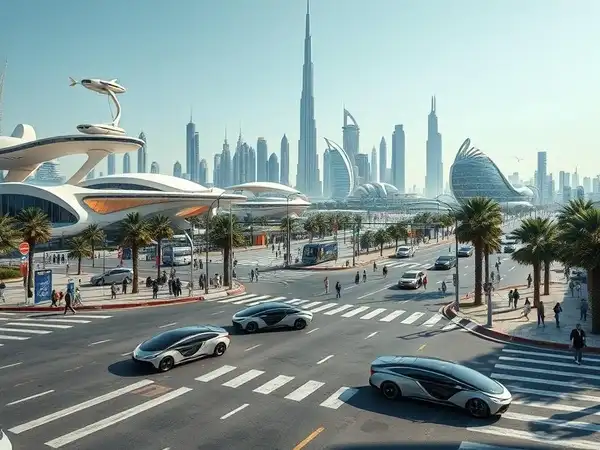Dubai, known for its futuristic vision and cutting-edge infrastructure, has taken another leap toward becoming a global leader in autonomous mobility. The city has announced plans to launch a 15-kilometer corridor dedicated to driverless transport by 2026, a move that could redefine urban mobility and reduce congestion across the emirate.
This ambitious project aligns with the Dubai 2030 Smart Mobility Strategy, which aims to make 25% of all transportation autonomous by the end of the decade.
🚦 A Game-Changer for Dubai’s Smart City Goals
The driverless transport corridor will be one of the first of its kind in the Middle East and will serve as a testbed for autonomous technology integration in public transport.
Key objectives include:
- Reducing Traffic Congestion – Self-driving vehicles will operate on optimized routes.
- Lowering Emissions – Autonomous electric vehicles will support Dubai’s green mobility goals.
- Enhancing Safety – AI-powered navigation will minimize human error, the leading cause of road accidents.
This initiative is being spearheaded by the Roads and Transport Authority (RTA) in collaboration with international technology partners.
🚗 What the 15-km Driverless Corridor Will Look Like

The corridor will feature:
- Dedicated Autonomous Lanes – Ensuring smooth movement without interference from traditional traffic.
- Smart Traffic Systems – AI-controlled signals and connected infrastructure for seamless operations.
- Integration with Metro and Tram Lines – Enabling last-mile connectivity.
- Charging and Maintenance Hubs – For electric driverless vehicles to operate round-the-clock.
🏙️ Pilot Routes and Key Locations
While exact locations are yet to be officially revealed, experts believe the corridor will connect major residential, commercial, and tourist areas, likely including:
- Downtown Dubai
- Dubai Marina
- Business Bay
- Expo City Dubai
This will provide both residents and visitors with a glimpse into the future of urban, car-free transport ecosystems.
🌍 Dubai’s Autonomous Transport Vision
Dubai’s leadership has been pushing for a transition to autonomous systems across multiple sectors.
| Year | Milestone |
|---|---|
| 2020 | Autonomous vehicle trials begin with limited routes |
| 2022 | First autonomous taxi tested in Jumeirah |
| 2025 | Expansion of pilot projects across city zones |
| 2026 | Launch of 15-km dedicated corridor |
| 2030 | Target: 25% of trips to be autonomous |
This latest announcement is a key step toward the 2030 vision, promising a safer, cleaner, and smarter urban transport system.
🤖 Technology Behind the Corridor
The driverless corridor will rely on a mix of AI, IoT, and 5G technologies.
- AI Navigation Systems – Real-time traffic analysis for optimal route planning.
- LiDAR and Radar Sensors – For obstacle detection and safety compliance.
- Connected Infrastructure – Traffic lights, road signs, and cameras communicating with vehicles.
- Data Analytics – To monitor performance and improve efficiency over time.
International companies from the US, Europe, and Asia are expected to collaborate on the project, turning Dubai into a hub for autonomous mobility innovation.
🏆 Benefits of Driverless Transport in Dubai
1. Safety and Accident Reduction
Human error accounts for nearly 90% of road accidents worldwide. Autonomous vehicles can significantly reduce collisions through precise driving and real-time monitoring.
2. Sustainability Goals
Dubai aims to cut carbon emissions by 30% by 2030. Electric autonomous vehicles will play a major role in achieving this target.
3. Economic Growth
The corridor is expected to attract:
- Global tech investors
- AI research partnerships
- Job opportunities in mobility tech
4. Tourism and Branding
Positioning Dubai as the world capital of innovation, attracting tech-driven travelers and investors.
📊 Global Context: Dubai Leading the Way
Dubai is joining the ranks of cities like San Francisco, Singapore, and Shanghai that have rolled out large-scale autonomous transport projects.
| City | Project | Status |
|---|---|---|
| San Francisco | Waymo driverless taxis | Active |
| Singapore | Autonomous shuttle buses | Pilot |
| Shanghai | Smart AI road networks | Active |
| Dubai | 15-km driverless corridor | Launching 2026 |
Dubai’s move is significant because it is creating a full corridor dedicated to AVs, rather than just testing small-scale pilots.
🔑 Challenges and Considerations
While the project is promising, experts point out key challenges:
- Regulatory Frameworks – Establishing laws for liability in case of accidents.
- Public Acceptance – Gaining trust from residents to use autonomous vehicles.
- Cybersecurity Risks – Protecting systems from hacking and data breaches.
Dubai’s RTA has already announced strict safety and cybersecurity protocols to address these concerns before the 2026 launch.
🧠 Expert Opinions
Transport futurist Dr. Ahmed Al-Mansoori says:
“Dubai is not just building a corridor, it is building the future of cities. The driverless transport initiative will serve as a blueprint for other countries.”
Urban planner Sarah Williams adds:
“What makes Dubai unique is its ability to move from concept to implementation quickly. This will accelerate global adoption of autonomous mobility.”
🎯 Conclusion: Driving the Future, Today
The launch of Dubai’s 15-km driverless transport corridor in 2026 will be a turning point for the region. By combining technology, sustainability, and visionary leadership, Dubai is showing the world that smart mobility is not just a concept but a reality in progress.
With this project, Dubai moves closer to its 2030 goal of becoming the most innovative, sustainable, and tech-forward city in the world.

